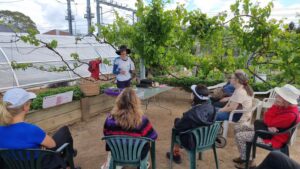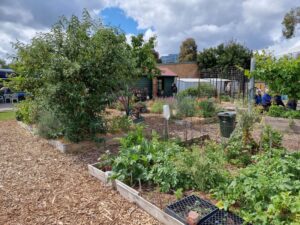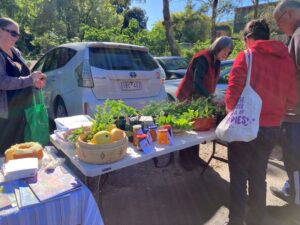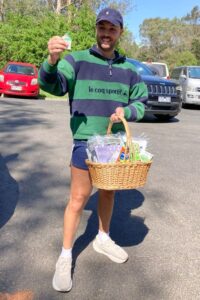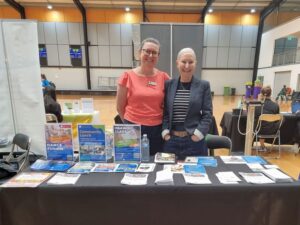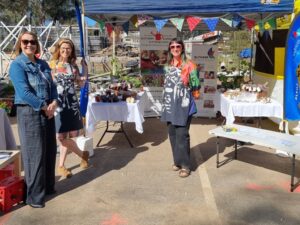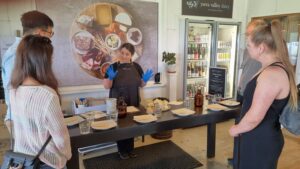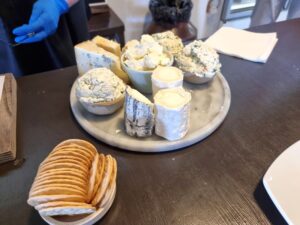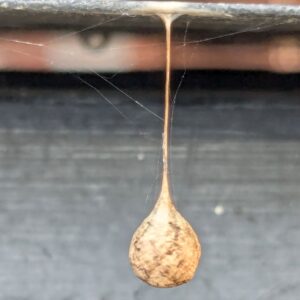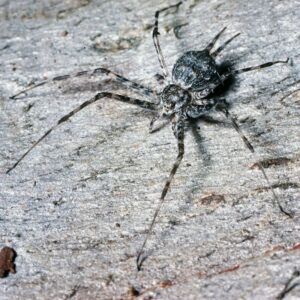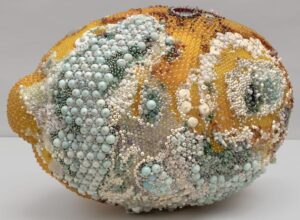Thanks to the people who have contributed to this week’s newsletter: Angela Harridge, Ann Stanley, Holly Gallagher, Jen Chellew, Lee Hirsh, Pam Jenkins, Rachel Bishop, Sue Dyet and Tracy Gillard.
Another mead recipe – spiced metheglin
 [My wife and I have entered our mead to the upcoming Eltham Wine Show, which will be judged on Saturday (i.e. 16th November). The results will be announced on the following day (i.e. Sunday, 17th November) at the public show at the Veneto Sports and Entertainment Centre, 191 Bulleen Road, Bulleen, which will be open to the public for tastings from 10.30am to 2.30pm. So, when you read this newsletter, the results won’t be known but it will be known that they will soon be known (to misquote erstwhile United States Secretary of Defense, Donald Rumsfeld). Whatever the result, good or bad for the Palmer household, I will announce it in next week’s newsletter! Incidentally, the Sunday show is a great event to go to because the range of wines and other drinks available for tastings is both varied and huge.]
[My wife and I have entered our mead to the upcoming Eltham Wine Show, which will be judged on Saturday (i.e. 16th November). The results will be announced on the following day (i.e. Sunday, 17th November) at the public show at the Veneto Sports and Entertainment Centre, 191 Bulleen Road, Bulleen, which will be open to the public for tastings from 10.30am to 2.30pm. So, when you read this newsletter, the results won’t be known but it will be known that they will soon be known (to misquote erstwhile United States Secretary of Defense, Donald Rumsfeld). Whatever the result, good or bad for the Palmer household, I will announce it in next week’s newsletter! Incidentally, the Sunday show is a great event to go to because the range of wines and other drinks available for tastings is both varied and huge.]
A few months ago, I published an article on how to make mead, which is fermented honey and an alternative to white wine. Subsequently, newsletter reader Sue Dyet gave me the notebooks of her late husband, Harry Gilham. In his notebooks, Harry, who was the longtime President of Eltham and District Winemakers Guild, had written lots of recipes for various wines plus a few meads. Many of these recipes were amended versions of recipes that he had attributed to ‘G. Mann’. I spoke to Angela Harridge, current Vice President of the Guild and another newsletter reader, and she told me that ‘G. Mann’ was Gladys Mann, who wrote a book called Home Wine & Beer Making (published in 1975) which, inter alia, contained a good recipe for a spiced mead called metheglin. So, I acquired the book and made the metheglin. It’s really yum so I thought that I would share the recipe.
The table below shows Gladys Mann’s ingredients in the left hand column compared to those of the Joe’s ancient orange mead discussed in my original article. The methods that I use are the same.
Metheglin |
Joe’s ancient orange |
| 1.8Kg honey (raw) 230g demerara sugar |
1.6Kg honey (raw) |
| water (chlorine free) 0.2 litres cold tea |
water (chlorine free) |
| 1 cinnamon stick 6 cloves 28g raisins juice and rind of 1 lemon 14g bruised ginger some grated nutmeg |
1 cinnamon stick 2 cloves 15g raisins 1 orange |
| 1 small packet sherry yeast | 1 teaspoon bread yeast |
Whilst the two meads share most ingredients, they actually taste rather different, perhaps because of the ginger and nutmeg. I don’t know whether the demerara sugar changes the taste but it certainly gives the mead a lovely amber colour. And I know from experimentation that bread yeast (which is easily obtainable) can be used in place of sherry yeast (which is somewhat specialised).
If you are a wine maker or beer maker, why not have a go at making mead? It’s pretty easy to make and also pretty easy to drink. Read my article on how to make mead.
The free, local community meals
I have spent much of the past week updating our map of community meals, deleting ones that no longer seem to happen and adding ones that I have only recently found out about. The end result is a total of 26 regular meals, comprising 15 lunches and 11 dinners. Three types of organisation stand out as being active in this space:
- Neighbourhood houses (Brunswick, Coburg, Hawthorn, Lilydale, Reservoir, Rosanna and Thornbury).
- Churches (Brunswick, Croydon, Greensborough, Lilydale, Fawkner, Mill Park, Mooroolbark and Preston).
- Activist organisations (Food Not Bombs, Open Table).
A news update about The Veggie Empire
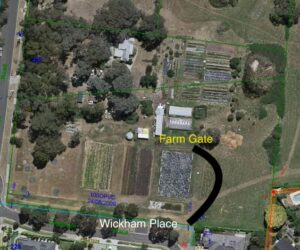 [The information below has come from Rachel Bishop.]
[The information below has come from Rachel Bishop.]
The Veggie Empire are farming duo Josh and Scott, who live with disabilities. Long term friends, they have been supported over many years, recently culminating in the establishment of Caring Farms Co-Op.
Caring Farms Co-Op is a non-for-profit urban farming co-operative that collectively manages both a market garden and a food plant nursery in St Helena. Its mission is to alleviate marginalisation, disadvantage and social exclusion amongst people living with disabilities by providing a place of work and agency in an urban farming enterprise.
Josh and Scott, under their original name of The Veggie Empire, are in their 15th year of working together in urban agriculture. They started out veggie gardening in a disability service then moved on to Edendale Community Environment Farm, where they engaged in ACFE courses in horticulture and became volunteers in the nursery to learn skills. You might know them as the growers of seedlings sold at Edendale or maybe from their starring performance on Gardening Australia with Costa!)
Over the past 10 years, they have been establishing an urban farm (Beales Road Farm) on leased Department of Transport land in St Helena alongside their specialist support workers (that they call supphorticulturalists).
Josh, Scott and their support workers have now collectively established the recently registered Caring Farms Co-Op. Following a period of transition, Caring Farms Co-Op will be the sole name used for their business, community and charitable activities.
Caring Farms Co-Op will be opening a farm gate shop in early 2025(!). This is being supported by grants from NELP Fund (for the shop itself) and Banyule City Council (for power and solar set up).
In the lead up to the permanent shop, they will be setting up a weekly farm gate stall on Wednesdays, 10am-1pm at Wickham Place in St Helena. They will be selling their locally grown and freshly harvested plus seedlings and herb plants. In addition, they will be selling some veggies grown by Farm Raiser in Bellfield.
The first stall will be on Wednesday, 20th November, 10am-1pm. Follow their signs and look for their yellow top marquee in the paddock next to their grow tunnel.
Do you know?
Jen Chellew wants to know whether or not the worms in her compost are a different type of worm than the earthworms found elsewhere in her garden. “Gardening Australia and others have told me that the worms in my compost are different to the worms in my garden. But I doubt this. The abundant worms in my compost have come from somewhere, presumably the soil on which I’ve placed the bin. I certainly haven’t added them. I reckon they wriggled up, enjoyed the medium and multiplied liberally. Then I return them as part of the compost to the garden. I know that worm farms require a specific worm, but my compost isn’t a worm farm.”
If you know the answer to Jen’s question, send us an email.
Want some Brussels sprouts seedlings?
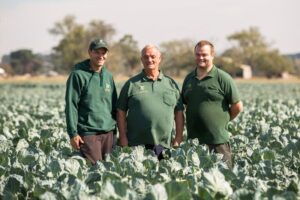 Ever wondered where the Brussels sprouts that you see in your supermarkets were grown? The answer is quite likely to be the Adams Farms based in Coldstream, where they grow around 120 acres of Brussels sprouts each year.
Ever wondered where the Brussels sprouts that you see in your supermarkets were grown? The answer is quite likely to be the Adams Farms based in Coldstream, where they grow around 120 acres of Brussels sprouts each year.
Ever wondered when you should plant Brussels sprouts seedlings? Contrary to received wisdom, the Adams Farms will tell you that now, November, is the best time to plant them and that, even though most brassicas are grown in Melbourne over winter, Brussels sprouts should be grown over summer.
Ever wondered where you can get Brussels sprouts seedlings from? For a lucky few of you, the answer is me! I went to the Adams Farms last week and they gave me 24 seedlings to give away to newsletter readers. That’s 6 for each of the first 4 people to email me to say that you want them. Pick up from my house in Eltham.
Thanks to the Adams family, Bruce, Daniel and Jeremy for welcoming me onto their property and giving me their seedlings!
It’s the season for community garden open gardens
Last Sunday, it was the turn of Fairfield. See photos below. Thanks to Judi and Kay for showing me round!
Next Saturday (16th November), it will be the turn of Bellfield.
Then, next Monday (18th November), it will be FINBAR in Richmond.
The Brunswick Multicultural Festival
Brunswick Neighbourhood House are holding a Multicultural Festival on Sunday, 24th November. As well as cultural performances, music and food vendors, it will include 4, free, food-related workshops, namely:
- Pizza dough cooking demonstration; Sunday, 24th November, 11.05am-12.05pm; free; Brunswick.
- Summer planting masterclass; Sunday, 24th November, 11.30am-12.30pm; free; Brunswick.
- Pandan crepe cooking demonstration; Sunday, 24th November, 12.30-1.30pm; free; Brunswick.
- Pot and plant your own seedling; Sunday, 24th November, 1-2pm; free; Brunswick.
Want to see some urban agriculture in City of Yarra?
The City of Yarra Council have put together two self-guided tours.
The Yarra North tour is a 3Km walk, starting at the Rushall Community Garden in Fitzroy North and ending at the Railway Garden in Princes Hill.
The Yarra South tour is a 1Km walk, starting at St Stephen’s Anglican Church Community Garden in Richmond and ending at Finbar Neighbourhood House in Richmond.
Some regular activities at Mooroolbark Community Garden
Mooroolbark Community Garden have just started a picnic on the 2nd Friday of each month, starting 5.30pm. Take your own food, listen to music and play board games. They will provide the tables and chairs.
This is in addition to their regular market, which happens on the last Sunday of each month, 9am-2pm, and mainly features local craft stalls. Here are some photos from their last market.
The DIVRS festival season appeal
As you will know from previous newsletters, the Darebin Information, Volunteer and Resource Service (DIVRS), based in Preston, do lots of things in the food justice space, and in the support space more generally. In 2024, they provided support to around 6,300 people. But, of course, it all needs to be funded one way or another. In this context, they have just launched their festival season appeal. As they say, “Your donation can make a real difference for families and individuals at this time of year.”
Read more and potentially donate.
Warrandyte Food Swap’s 9th birthday (by Ann Stanley)
[Warrandyte Food Swap celebrated its 9th birthday last Saturday. Ann Stanley has reported in on how it went.]
One lucky visitor, Sayf, won our birthday raffle and is shown below posing with his basket of seeds, garden tools and other goodies.
Our new prominent position in the carpark outside the Warrandyte Community Garden in Police Road has meant that we are growing, with regular visitors who drop off their surplus garden produce, whether it be a bag of lemons, some saved seeds or new seedlings from seeds previously swapped with someone else.
We swap our surplus on the first Saturday of every month (except January) at 9-10am. It’s the same day as the Warrandyte market and we are near the entrance to that market. If you see us, come and say hello. No money is exchanged but you won’t leave empty-handed! We’d love to give you some greens, a bag of seeds or a jar of relish to take home, all in the spirit of community sharing and home-grown food.
See you on Saturday, 7th December!
Some recent stalls by food-related organisations
Per the left hand photo below, Karen from Olympic Neighbourhood House in Heidelberg West and Lucie from Watsonia Neighbourhood House, both of whom are active in the food space, were at the Ageing Well Expo in Macleod on 26th October.
Per the right hand photo below, the Stephanie Alexander Kitchen Garden at Eltham Primary School was at the Eltham Rotary Festival on 9th November.
If your organisation ever has a stall at any festival or similar, send us a photo together with a few words and we will include it in a future newsletter.
Cheese tastings at the Yarra Valley Diary
A few days ago, I went to a cheese tastings at the Yarra Valley Dairy in Yering. The options were $5 for 4 cheeses or $15 for 10 cheeses, in either case being given a guided tastings by a member of their staff. I did the 10 cheese option, which is therefore the one in the photos below. I think that you can just rock up for the tastings.
Baked cheesecake (by Sharee from Yarra Valley Dairy)
[When I was at Yarra Valley Dairy for the cheese tastings, I noticed that they had a number of printed recipes on the counter. I asked which was their best recipe and they nominated this baked cheesecake one.]
Ingredients
250g packet of plain sweet biscuits
125g butter, melted
750g cream cheese or curd cheese
1 teaspoon finely grated lemon
1 cup (220g) caster sugar
3 eggs
¾ cup (180g) sour cream
¼ cup (60ml) lemon juice
Method
Using a food processor, process the biscuits until fine. Add the butter and process until combined.
Press the mixture over the base and sides of a 24cm springform pan. Place on an oven tray and refrigerate for 30 minutes.
Pre-heat your oven to 160degC (140degC fan-forced).
Beat the cream cheese, lemon rind and sugar in a medium bowl with an electric mixer until smooth. Beat in the eggs, one at a time, then the sour cream and juice.
Pour the filling into a pan. Bake for 60 minutes or until just set in the centre. Turn off the oven and cool the cheesecake in the oven with the door ajar.
Cover and refrigerate for 3 hours or overnight before serving.
Critter of the week – two-tailed spider
The left hand photo (from Pam Jenkins’ garden) is an egg sac of a two-tailed spider (genus Tamopsis in family Hersiliidae) whilst the right hand one (from the Internet) is of an adult spider from the same genus.
Pam found the egg sac dangling from her letterbox. It was around 5mm wide. Whilst all spiders lay egg sacs, their colour, size and position vary widely depending on the species.
Adult two-tailed spiders are small to medium-sized spiders. They live in trees (rather than on the ground) and are often well camouflaged against the bark. They do not make complex webs.
The common name of two-tailed refers to their two elongated spinnerets at the rear of their bodies (which you can see in the right hand photo).
Thanks to Pam for the photo. If you have any interesting photos of critters in your garden, email them to me.
Read about our previous insects (or other critters) of the week on our website.
Which link was clicked most times in the last newsletter?
The most popular link in the last newsletter was SGA’s article on managing rats with IPM.
The most popular event link in the last newsletter was the upcoming Greensborough repair cafe on 16th November.
 Joke (or pun) of the week
Joke (or pun) of the week
Why did the ice cream truck breakdown? There was a rocky road. (submitted by Lee Hirsh)
Regular activities over the coming week
Farmers’ and other food markets
- Friday: Farm Raiser farm shop (Bellfield) and Community Grocer, Carlton.
- Saturday: Carlton, CERES farm gate (Coburg), Coburg and Farm Raiser farm shop (Bellfield).
- Sunday: Alphington, Eltham and Yarra Valley.
- Tuesday: Community Grocer, Fitzroy.
- Next Wednesday: Caring Farms Coop farm gate (St Helena) and Really Really Free Market (Coburg).
The Caring Farms Coop farm gate, 10am-1pm, at Wickham Place in St Helena, is a new farm gate, selling their locally grown and freshly harvested plus seedlings and herb plants.
Food swaps
- Saturday: Box Hill, Brunswick East, Bulleen, Diamond Creek, Fairfield, Forest Hill, North Coburg and Reservoir.
- Sunday: Ringwood, St Andrews and Surrey Hills / Balwyn.
Community gardens
- Thursday: Buna (Heidelberg West), Diamond Valley Library (Greensborough), Edible Hub (Hurstbridge), Fawkner (playgroup – need to book), SEEDs (Brunswick) and Whittlesea.
- Friday: Panton Hill and West Brunswick.
- Saturday: Bellfield composting workshop and garden tour, Glen Park Oaks (Bayswater North), Links (Lalor), Macleod, Radicle Roots (Coburg) and Thrive (Diamond Creek).
- Sunday: Croxton / Marra Guwiyap (Northcote, Fawkner Food Bowls and Regent (Reservoir).
- Monday: FINBAR garden party (Richmond), SEEDs (Brunswick) and Whittlesea.
- Tuesday: Watsonia.
- Next Wednesday: Eltham Neighbourhood House, Macleod, Newton Street (Reservoir), Sylvester Hive (Preston) and Span (Thornbury).
Upcoming face-to-face events – not cooking
Varroa Development Officer presentation; Sunday, 17th November, 11am-12.30pm; free; Brunswick East.
Victorian Varroa Development Officer will lead a practical discussion on keeping bees happy and healthy, and the realistic changes that you can make in your apiary now to prepare for varroa.
Summer planting masterclass; Sunday, 24th November, 11.30am-12.30pm; free; Brunswick.
Discover the ins and outs of summer seedlings and how to prepare your own garden. Work together to plant out one of their garden beds. Part of the Brunswick Multicultural Festival, which will include cultural performances, music and food vendors, as well as workshops.
Presenter: Laurel Coad. Organised by Brunswick Neighbourhood House.
Pot and plant your own seedling; Sunday, 24th November, 1-2pm; free; Brunswick.
Pot up your own summer seedlings to take home, learning about what to plant, how to care for your seedlings, and tips on organic pest and disease management. Part of the Brunswick Multicultural Festival, which will include cultural performances, music and food vendors, as well as workshops. Presenter: Laurel Coad. Organised by Brunswick Neighbourhood House.
In November
- Bundoora Urban Agriculture Centre and Community Hub pre-launch site tour; Wednesday, 13th November, 3-4pm; free; Bundoora.
- Veggie seedling propagation workshop – Caring Farms Coop; Thursday, 14th November, 6-7.30pm; free; Greensborough.
- Seed exchange and the art of nurturing local resilient seed; Friday, 15th November, 4-5pm; $11; Coburg North.
- Growing community through seed stewardship – sharing corn culture; Saturday, 16th November, 9.30-10.30am; $11; Coburg North.
- Bundoora Urban Agriculture Centre and Community Hub pre-launch site tour; Saturday, 16th November, 10-11am; free; Bundoora.
- Composting workshop and garden tour (Bellfield); Saturday, 16th November, 10-midday; free; Bellfield.
- Kevin Heinze GROW Coburg site and program tour; Saturday, 16th November, 10.15-10.45am; free; Coburg.
- Kevin Heinze GROW Coburg site and program tour; Saturday, 16th November, 11.15-11.45am; free; Coburg.
- Celebration and showcase of the City of Whittlesea sustainable communities workshop series; Saturday, 16th November, midday-2pm; free; South Morang.
- Curds and chardonnay; Saturday, 16th November, midday-3pm; $59 ($20 per hour); Warrandyte South.
- Eltham Wine Show; Sunday, 17th November, 10.30am-2.30pm; $20; Bulleen.
- Varroa Development Officer presentation; Sunday, 17th November, 11am-12.30pm; free; Brunswick East.
- FINBAR garden party; Monday, 18th November, 10.30am-3pm; free; Richmond.
- Bundoora Urban Agriculture Centre and Community Hub pre-launch site tour; Wednesday, 20th November, 3-4pm; free; Bundoora.
- Low-waste celebrations with The Urban Nanna; Thursday, 21st November, 6.30-8pm; free; Preston.
- What is the future of urban agriculture in Naarm?; Thursday, 21st November, 6.30-8pm; free; Fitzroy North.
- Bundoora Urban Agriculture Centre and Community Hub pre-launch site tour; Saturday, 23rd November, 10-11am; free; Bundoora.
- Good & bad bugs, pests, snails & slugs and how to control them; Saturday, 23rd November, 10-midday; free; Bellfield.
- Beeswax wraps; Saturday, 23rd November, 10am-midday; $80 ($40 per hour); CERES.
- FareShare kitchen garden open day; Saturday, 23rd November, 10am-3pm; small donation requested; Abbotsford.
- Small space gardening; Saturday, 23rd November, 10am-3pm; $115 ($23 per hour); CERES.
- Organic pest and disease management; Saturday, 23rd November, 1-2pm; free; Fitzroy North.
- Beginners backyard beekeeping; Sunday, 24th November, 10am-3pm; $220 ($44 per hour); CERES.
- In-depth mushroom cultivation workshop; Sunday, 24th November, 10am-4pm; $161 ($27 per hour); Alphington.
- Summer planting masterclass; Sunday, 24th November, 11.30am-12.30pm; free; Brunswick.
- Pot and plant your own seedling; Sunday, 24th November, 1-2pm; free; Brunswick.
- Fitzroy urban agriculture walk; Wednesday, 27th November, 2.15-3.30pm; free; Fitzroy.
- Dalmore Whisky masterclass; Wednesday, 27th November, 6-10pm; $60 ($15 per hour); Croydon.
- Create your own beeswax wraps; Thursday, 28th November, 6.30-7.30pm; free; Eltham.
- Italian cheese and wine masterclass; Saturday, 30th November, 2-5pm; $135 ($45 per hour); Thomastown.
In December
- Plants and permaculture; Sunday, 1st December, 10am-3pm; $145 ($29 per hour); CERES.
- Getting ready for the summer harvest (part 2); Wednesday, 4th December, 7-9pm; free; Doncaster.
Regular events
- Beekeeping (Bee Sustainable); roughly once a month on Saturdays, 1-4pm; $95 ($32 per hour); Brunswick East.
- Best of Little Italy dinner tour (Flavourhood Tours); Fridays, 5-7pm; $139 ($70 per hour); Carlton.
- Brewery tour (Carlton Brewhouse); every Wednesday, Thursday and Friday, 3-4.30pm; $38 ($26 per hour); Abbotsford.
- Brewing coffee, various (Padre Coffee); Saturdays, 12.30-1pm (free) and Sundays, 1-4pm ($150); Brunswick East.
- Chocolate factory tour (Ratio Cocoa Roasters); Various Fridays and Saturdays; $20 ($20 per hour); Brunswick.
- Cocktail making (Brogan’s Way Distillery); various dates, times and costs; Richmond.
- Eltham walking food tour; various Saturday mornings and Thursday evenings; $65 ($22 per hour); Eltham.
- Melbourne’s ‘insiders’ brunch tour (Flavourhood Tours); various Saturdays, 10am-midday; $69 ($35 per hour); Coburg.
- Food forest tour (Edible Forest); Fridays and Saturdays, 11am-1pm and 1-3pm; $28 ($14 per hour); Dixons Creek.
- Gin making (Puss and Mew); Saturdays and Sundays; $175 ($58 per hour); Nunawading.
- Gin making or tasting (Naught Distilling); Saturdays, various times and prices; Eltham.
- Plant to harvest (Sustainable Macleod); 1st Saturday of the month, midday-1pm; $5; Macleod.
- Wine tasting (FoodSocial); various Thursdays, 6-7.30pm; $33 ($22 per hour); Carlton.
- Wine tasting (Northside Wines); various days, times and prices; Northcote.
Upcoming face-to-face events – cooking
Julius Roberts – The Farm Table; Tuesday, 19th November, 6.30-9.30pm; $127 ($42 per hour); Richmond.
The November cook book is The Farm Table by Julius Roberts, which shows how cooking seasonally can be both fun and delicious, and also celebrates the English countryside and the slower pace of rural life. They will be cooking three courses of dishes from the book for you to enjoy over supper.
Kombucha and jun, M.O.B.; Thursday, 21st November, 6.30-8.30pm; $40 ($20 per hour); Fitzroy North.
Kombucha is traditionally made with black tea and sugar, and jun with green tea and honey. Learn how to feed your mother/SCOBY (choose between kombucha or jun) and then flavour their your own batch ready for second phase fermentation using fruits, herbs and spices that they will provide. M.O.B. stands for ‘mingling over bacteria’.
Pizza dough cooking demonstration; Sunday, 24th November, 11.05am-12.05pm; free; Brunswick.
Learn how to elevate your pizza-making skills at home, with plenty of tasting along the way. Also includes a tour of the community garden and small harvest. Part of the Brunswick Multicultural Festival, which will include cultural performances, music and food vendors, as well as workshops. Presenter: Cass Hogan. Organised by Brunswick Neighbourhood House.
Pandan crepe cooking demonstration; Sunday, 24th November, 12.30-1.30pm; free; Brunswick.
Learn how to make Indonesian pandan crape. Part of the Brunswick Multicultural Festival, which will include cultural performances, music and food vendors, as well as workshops. Presenter: Cass Hogan. Organised by Brunswick Neighbourhood House.
Shannon Martinez – plant-based chef unveils vegan Italian food; Tuesday, 26th November, 6.30-8pm; free; Fitzroy North.
Shannon Martinez will discuss her new cookbook, Vegan Italian Food. She will share some of her favourite dishes, discuss the benefits of getting more plant-based foods into our diets, and offer her top tips for creating plant-based meals at home. You can buy a signed copy of the book.
Christmas cookie swap; Saturday, 14th December, 10am-midday; $55 ($28 per hour); Richmond.
Bake 20 cookies using your favourite recipe (nothing too fancy, just bring the Christmas vibes). They will set them all out, and everyone gets to fill a box with 20 different cookies from other bakers to take home. There will be drinks, snacks and chatting along the way.
Gingerbread house workshop with sparkling wine; on Thursday, 19th December, 7-8.30pm and then again on Friday, 20th December, 7-8.30pm; $60 ($40 per hour); Wandin North.
Build your own gingerbread house. What’s included: gingerbread house kit, baseboard, lollies to decorate, icing, and cellophane & ribbon to wrap it up.
Christmas gingerbread house family workshop; Saturday, 21st December, 10.30am-midday; $50 ($33 per hour); Wandin North.
Work with your teenage child or grandchild to build and decorate your family’s very own gingerbread house. What’s included: gingerbread house kit, baseboard, lollies to decorate, icing, and cellophane & ribbon to wrap it up.
In November
- Kimchi M.O.B.; Thursday, 14th November, 6.30-8.30pm; $65 ($33 per hour); Fitzroy North.
- Make garden onigiri and warrigal green miso soup; Friday, 15th November, 5-6pm; $11; Coburg North.
- Ultimate Mediterranean meze; Saturday, 16th November, 10am-12.30pm; $75 ($30 per hour); Ringwood North.
- Mini master cooks (9-12 years) – fruit shortcakes; Saturday, 16th November, 10.30am-12.30pm; $55 ($28 per hour); Forest Hill.
- Nukazuke – Japanese lactic fermentation pickles workshop; Saturday, 16th November, 11am-1.30pm; $65 ($33 per hour); Fitzroy North.
- Christmas cookie decorating; Saturday, 16th November, 1-4pm; $50 ($17 per hour); Ringwood North.
- Food for mind and gut; Sunday, 17th November, 10am-2.30pm; $150 ($33 per hour); CERES.
- Julius Roberts – The Farm Table; Tuesday, 19th November, 6.30-9.30pm; $127 ($42 per hour); Richmond.
- Indian cooking – Punjabi (2 sessions); on Wednesdays, 20th and 27th November, both 6.30-8.30pm; $118 ($30 per hour); Hurstbridge.
- Kombucha and jun, M.O.B.; Thursday, 21st November, 6.30-8.30pm; $40 ($20 per hour); Fitzroy North.
- Sourdough bread workshop; Saturday, 23rd November, 10am-1pm; $55 ($18 per hour); Panton Hill.
- Fermenting at home; Sunday, 24th November, 10am-1pm; $120 ($40 per hour); CERES.
- Plant-based cooking; Sunday, 24th November, 11am-1pm; $25 ($13 per hour); Forest Hill.
- Pizza dough cooking demonstration; Sunday, 24th November, 11.05am-12.05pm; free; Brunswick.
- Sake x fermented food pairing; Sunday, 24th November, midday-1.30pm; $107 ($71 per hour); Fitzroy North.
- Pandan crepe cooking demonstration; Sunday, 24th November, 12.30-1.30pm; free; Brunswick.
- Sake x fermented food pairing; Sunday, 24th November, 2-3.30pm; $107 ($71 per hour); Fitzroy North.
- Shannon Martinez – plant-based chef unveils vegan Italian food; Tuesday, 26th November, 6.30-8pm; free; Fitzroy North.
- St John’s Christmas gingerbread house making event; Friday, 29th November, 7-9pm; $45 ($23 per hour); Diamond Creek.
- Handmade gnocchi masterclass and lunch; Saturday, 30th November, 11am-2pm; $153 ($51 per hour); Brunswick.
- Mexican cooking; Saturday, 30th November, 10am-3pm; $150 ($30 per hour); CERES.
- A flavourful night with Nana Africa and ReWine; Saturday, 30th November, 1-3pm; $65 ($33 per hour); Brunswick East.
- A flavourful night with Nana Africa and ReWine; Saturday, 30th November, 4-6pm; $65 ($33 per hour); Brunswick East.
In December
- Sourdough bread baking; Sunday, 1st December, 9am-5pm; $220 ($28 per hour); CERES.
- Festive cooking with Natalie; Thursday, 5th December, 6-8pm; $48 ($24 per hour); Forest Hill.
- Mini master cooks (9-12 years) – Christmas cookies; Saturday, 7th December, 10.30am-12.30pm; $55 ($28 per hour); Forest Hill.
- Cupcake decorating workshop; Saturday, 7th December, 5-7pm; $75 ($38 per hour); Ivanhoe.
- Vegan desserts; Sunday, 8th December, 10am-3pm; $150 ($30 per hour); CERES.
- Italian Xmas treats (2 sessions); on Tuesday, 10th December and Wednesday, 11th December, both 6-8pm; $79 ($20 per hour); Fawkner.
- Christmas cookie swap; Saturday, 14th December, 10am-midday; $55 ($28 per hour); Richmond.
- Christmas cupcakes; Saturday, 14th December, 1-4pm; $60 ($20 per hour); Ringwood North.
- Gingerbread cookie house workshop; Sunday, 15th December, 1-2.30pm; $65 ($44 per hour); Forest Hill.
- Gingerbread house workshop with sparkling wine; Thursday, 19th December, 7-8.30pm; $60 ($40 per hour); Wandin North.
- Gingerbread house workshop with sparkling wine; Friday, 20th December, 7-8.30pm; $60 ($40 per hour); Wandin North.
- Christmas gingerbread house family workshop; Saturday, 21st December, 10.30am-midday; $50 ($33 per hour); Wandin North.
Regular classes
- Many different classes (Brunswick Kitchen); various dates, times and prices; Brunswick.
- Many different classes (Cozymeal); various dates, times and prices; Carlton.
- Many different classes (Eat cook learn love food); various dates, times and prices; Carlton.
- Many different classes (Free to Feed); most days, various times; mostly 3 hours long and $155 ($52 per hour); Northcote.
- Many different classes (Otao Kitchen); various dates, times and prices but mostly 3 hours long and $197 ($66 per hour); Abbotsford.
- BBQ classes (BBQ Cooking School); various dates and times; $135-150 ($45-50 per hour); Brunswick.
- Biscuit making (Sissys); various Tuesdays, 10am-3pm; $162 ($32 per hour); Blackburn.
- Bread making (Convent Bakery); various Sundays, 8am-2pm; $230 ($38 per hour); Abbotsford.
- Cake decorating (Miss Biscuit); various dates, times and prices; Camberwell.
- Cake decorating (Sweetly Styled); various dates and times; $200 ($100 per hour); Carlton.
- Chocolate making (Sissys); various Thursdays, Fridays and Saturdays; $152 ($38 per hour); Blackburn.
- Chocolate making and pastry classes for children (Yarra Valley Chocolaterie); various dates, times and costs; Yarra Glen.
- Crepes (Little Yarra Creperie); Wednesdays 10am-1pm and Saturdays, 3-6pm; $120 ($40 per hour); Thornbury.
- Italian (Al Dente Cooking); Fridays and Saturdays, 9am-1pm; $155 ($39 per hour); Chirnside Park.
- Italian (Pietro Gallus); various dates, times and prices; Warrandyte South.
- Italian (Rosa’s); various Saturdays and Sundays, 10.15am-3pm; mostly $165 ($35 per hour); Bundoora.
- Italian (Small Axe); various dates, times and prices; Brunswick.
- Japanese (Paul Le Noury); various dates and times; $200 ($50 per hour); Carlton.
- Kombucha (Good Brew); last Thursday of each month, 7-8.30pm; $54 ($36 per hour); Brunswick.
- Let’s get cooking (Greenbrook Community House); every Monday during term times, midday-2pm; $10; Epping.
- Pickle party (Greenhills Neighbourhood House); Fridays during school terms, 9-11am; free; Greensborough.
- Sourdough bread making (Bee Sustainable); roughly once a month on Saturdays, 9-11.30am; $185 ($74 per hour); Brunswick East.
- Sourdough bread making (The Fermented Mumma); various dates, 6.30-8.30pm; $120 ($60 per hour); Collingwood.
- South American (Margot & Montanez); various dates and times; Abbotsford.
- Spanish (Natalia Martinez); various dates and times; $130 ($65 per hour); Carlton.
- Spanish (Paul Le Noury); various Fridays and Sundays; $180 ($45 per hour); Carlton.
- Taiwanese (Christina Chang); various dates, times and prices; Brunswick.
- Tea blending (Impala + Peacock); various Sundays; $75-89 ($60 per hour); Brunswick.
- Truffle making (Ratio Cocoa Roasters); various Sundays, 11am-1pm; $75 ($38 per hour); Brunswick.
- Truffle and praline making (Sissys); various Wednesdays, 6-10pm; $183 ($46 per hour); Blackburn.
- Nonna & Mum’s cooking class; 4th Thursday of each month, 7.30-10pm; $20 ($8 per hour); Thornbury.

